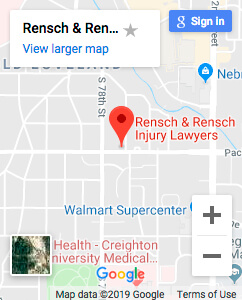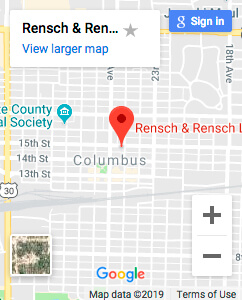Factory Collapse and Explosion Impacts Omaha Workers
 It’s been just over a week since a frightening building collapse at Omaha’s International Nutrition plant and workers are likely reeling with questions about what happened and how they continue to heal from this point on.
It’s been just over a week since a frightening building collapse at Omaha’s International Nutrition plant and workers are likely reeling with questions about what happened and how they continue to heal from this point on.
The roof and third floor of the factory collapsed onto the second floor as fire raged through the building, January 20th, killing two workers and injuring at least ten others. The injured workers are recovering from broken bones, burns and damaged organs.
“These are the absolute most serious types of workplace mishaps for members of Nebraska’s workforce,” said Omaha accident attorney, Richard Rensch.
Some of the survivors will require extensive medical care, time off work along with medical and occupational rehabilitation – not to mention weekly short term, long term and possibly life-long statutory disability indemnity benefits.
“The law provides workers’ compensation benefits for certain closely related and dependent family members of those workers whose lives were lost in the blast,” said Rensch.
Fire investigators said it looked like the building was ravaged by an earthquake. The plant, at 7706 I Plaza, will likely be demolished and OSHA investigators are working the scene.
“Just looking at the damage to the building, it’s amazing there were so many survivors,” said Rensch’s law partner and son, Sean Rensch.
He said firefighters, law enforcement, other first responders joined surviving employees, making heroic efforts to prevent even more people from dying.
“From the stories I’ve heard, all able bodied employees pitched-in to try to save their co-workers, showing true courage,” Sean said.
The Omaha World Herald is reporting the cause of the collapse is still unknown.
“With industrial accidents like this, it can sometimes take months for investigators to determine a cause. In the meantime injured workers need to concentrate on the healing process. Workers should be encouraged by their loved ones or legal representatives to seek medical attention with a physician familiar with the worker or the worker’s family members,” said Richard Rensch.
Rensch said a physician who has a stake in the outcome of his or her patient is likely the employee’s best option. He discourages workers from being treated by a physician referred by the employer or the employer’s work comp insurance company.
“That’s a natural conflict of interest that is ignored and seems to go unrecognized,” he said. In addition, the employee can’t wait around. That physician choice needs to be made very early, Richard Rensch added.
Rensch said when a spouse is killed in a work related accident, the surviving spouse is entitled to statutory survival benefits equal to a certain percentage of the spouse’s average weekly wage, according to Nebraska law.
Those spousal benefits are nearly instantly owed and a statutory penalty could apply if payments are not begun within thirty days – if the employer is properly on notice. Also children and qualified dependents of the deceased worker will have certain rights to benefits.
According to the Bureau of Labor, one Nebraskan dies in a workplace related accident each week, with fires and explosions accounting for about 3-percent of workplace deaths.
While most workplace injuries don’t involve fatalities, there are many cases where the injured worker needs time off to heal. In 2012, the Bureau of Labor reported more than 900,000 cases where injured workers required time off.
The insurance carriers pushing to get the injured employees prematurely back to work cause a multitude of problems for both the employers and employees.
“The insurers are profit motivated. The employers worry about rising costs of insurance premiums. In many cases, we sadly see more money spent by the insurers on case management expenses like case workers, private investigators (to videotape employees’ daily activities) and defense lawyers – than money paid to treat legitimately injured employees,” said Richard Rensch.
In 2012, cases involving sprains, strains and tears totaled more than 300,000 nationwide. Back injuries accounted for more than 177,000 cases and more than 200,000 workers reported slip and fall injuries.
“Not surprisingly, these are the kinds of work injuries where healing time is necessarily required”, added Sean Rensch.
Sometimes a case requires an attorney to examine several different areas of the law, in addition to workers’ compensation laws. Many cases involve claims against third parties who might share all or some of the responsibility in causing the work injury.
Common crossover issues involve personal injury law, products liability law, and other negligence related laws. Therefore, it is imperative that injured workers and their families retain experienced legal counsel so that all potentially viable claims are properly investigated and evaluated.
This blog is for information only and is not intended to be a substitute for professional legal advice.


